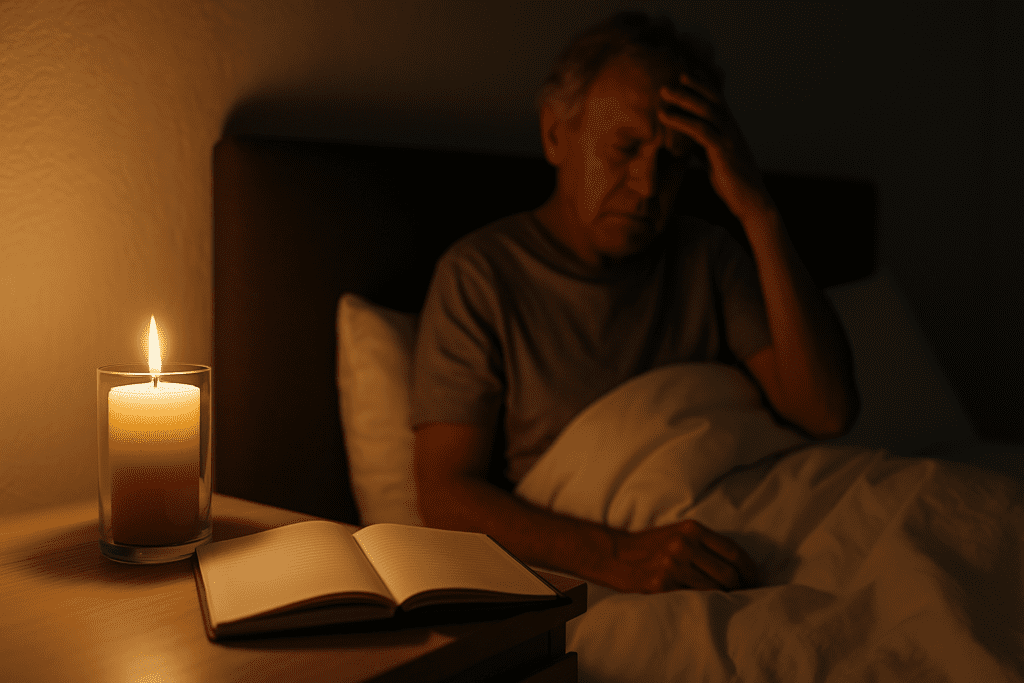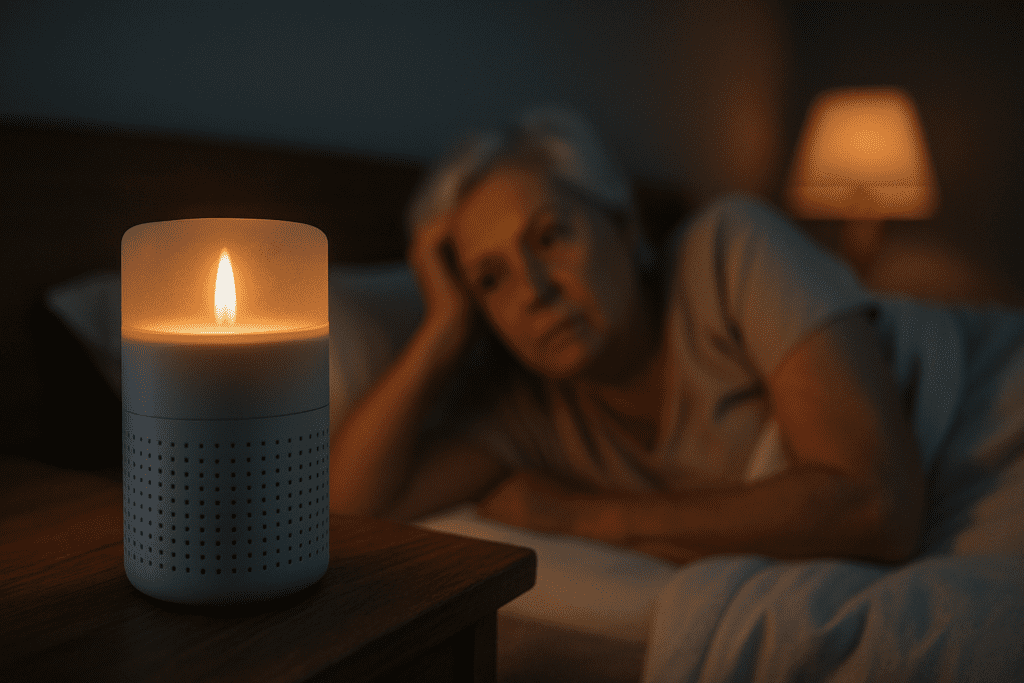Sleep, that essential process by which our brains consolidate memories, restore energy, and regulate mood, becomes tragically elusive for many individuals with dementia. The intimate relationship between dementia and sleeplessness is one that medical science continues to investigate with urgency, as poor sleep patterns often worsen cognitive symptoms and contribute to caregiver burnout. As the population ages, a growing number of families find themselves grappling with the painful reality of a dementia patient not sleeping for days, confused and disoriented by night, and unable to find rest. This article explores in depth how sleep affects dementia, the stages in which sleep disturbances typically occur, the science behind nighttime behaviors like talking or wandering, and what sleep aids—natural or pharmaceutical—might safely support both patients and caregivers in their pursuit of rest.
You may also like: How to Prevent Dementia and Alzheimer’s Disease Naturally: Expert-Backed Strategies to Reduce Your Risk Through Lifestyle and Diet
Dementia and Sleeplessness: A Vicious Cycle
The connection between dementia and sleeplessness is not merely correlative; it is a feedback loop that exacerbates symptoms on both ends. Research shows that disrupted circadian rhythms and neuronal degeneration within the suprachiasmatic nucleus—the brain’s internal clock—are prevalent among individuals with Alzheimer’s disease and related dementias. These disruptions manifest as fragmented sleep, increased nighttime awakenings, and difficulty falling back asleep. For those with frontotemporal or vascular dementia, the degree of sleep disruption may be more severe or erratic, often leading to profound behavioral changes during the evening hours.
In particular, dementia insomnia is both a symptom and a risk factor. Poor sleep quality has been associated with increased beta-amyloid plaque accumulation, which is a hallmark of Alzheimer’s pathology. This bi-directional relationship suggests that sleeplessness not only reflects neurodegeneration but may also actively accelerate it. This is why dementia sleep problems require early identification and nuanced intervention. By understanding the mechanisms that govern sleep and cognitive function, healthcare providers can tailor approaches to mitigate the compounding effects of sleep deprivation and cognitive decline.
Understanding How Sleep Affects Dementia
Sleep serves more than a restorative function; it plays a critical role in glymphatic clearance, a process by which the brain eliminates neurotoxic waste. This function becomes compromised in people with dementia, and insufficient sleep may further hamper the brain’s capacity to remove harmful proteins such as tau and beta-amyloid. Clinical studies using functional imaging have demonstrated that patients with irregular sleep patterns often experience more rapid cognitive deterioration.
The impact of sleep on mood and memory further underscores how sleep affects dementia progression. A lack of REM sleep—often diminished in neurodegenerative diseases—is linked to increased anxiety, irritability, and impaired short-term recall. Patients who suffer from chronic insomnia are also at higher risk of depression and hallucinations, complicating an already challenging disease trajectory. Understanding this interplay enables clinicians to view sleep disturbances not merely as an inconvenience, but as a critical therapeutic target in dementia care.

What Stage of Dementia Is Not Sleeping?
The question of what stage of dementia is not sleeping cannot be answered in a one-size-fits-all manner, but sleep disturbances typically become more pronounced during the middle to late stages of the disease. In the early stages, some individuals may begin to show signs of restlessness or nighttime confusion, but their ability to maintain a stable sleep-wake cycle often remains relatively intact. As the disease progresses, the degeneration of brain regions responsible for circadian regulation becomes more severe.
By the middle stage, symptoms such as sundowning—a phenomenon marked by late-day confusion and agitation—become more frequent. This often disrupts evening routines and leads to delayed sleep onset. In the advanced stages, individuals may sleep during the day and stay awake at night, leading caregivers to report that the dementia patient is not sleeping for days in a conventional sense, though periods of dozing may still occur. Such irregular sleep patterns are often mistaken for insomnia when they may represent a complete breakdown of the normal circadian rhythm.
Nighttime Behaviors and Their Implications
Among the most distressing manifestations of dementia and sleeping issues are nighttime behaviors such as talking to oneself, wandering, or even yelling in sleep. These symptoms not only disrupt rest but also pose safety concerns. Families often report dementia patients talking in sleep or even experiencing night terrors that make restful sleep nearly impossible. In some cases, vascular dementia sleep talking is accompanied by physical movements or expressions of fear, mimicking a form of parasomnia.
These nighttime behaviors are thought to originate from a combination of REM sleep behavior disorder, chronic confusion, and environmental disorientation. The brain’s impaired ability to regulate transitions between sleep stages can make patients act out dreams or engage in seemingly purposeful nocturnal activity. Caregivers should be cautious but informed; while elderly talking in sleep is not uncommon, persistent or distressing episodes may necessitate a review of medications, environmental stimuli, and neurological status.
For some patients, dementia talking to self at night is not merely random vocalization but a sign of unprocessed stress or hallucinations. This behavior can become particularly prominent in individuals who are left alone in a darkened room, prompting discussions on whether environmental modifications like nightlights or soothing music can mitigate anxiety and reduce sleep disruptions.
Dementia and Sleep Patterns: What Changes and Why
As cognitive decline accelerates, dementia and sleep patterns shift dramatically. Whereas a healthy adult progresses through multiple stages of non-REM and REM sleep in predictable cycles, dementia disrupts this balance. The length of REM sleep shortens, deep sleep becomes elusive, and awakenings increase in frequency and duration. In many cases, total sleep time decreases significantly, leading to excessive daytime sleepiness that further disrupts the sleep-wake cycle.
This altered architecture can be exacerbated by factors like comorbidities, polypharmacy, and even poor sleep hygiene. For instance, certain medications prescribed for managing dementia symptoms, such as cholinesterase inhibitors, may cause vivid dreams or nighttime awakenings. Meanwhile, conditions like obstructive sleep apnea—common among older adults—often go undiagnosed in dementia patients due to communication barriers.
Understanding these changes in sleep architecture helps guide more effective interventions. Whether through behavioral therapy, medication adjustments, or the use of assistive devices like CPAP machines, recognizing the underlying cause of disrupted sleep can dramatically improve quality of life for both the patient and their caregivers.
When a Dementia Patient Is Not Sleeping for Days
Few things are as alarming for a caregiver as a dementia patient not sleeping for days. This type of acute insomnia often signals a crisis point, potentially precipitated by infections, medication interactions, dehydration, or environmental stressors. Such periods of sleeplessness can lead to delirium, a temporary but dangerous exacerbation of confusion, hallucinations, and even aggressive behaviors.
In such instances, immediate medical evaluation is essential. Sleep deprivation can mimic or amplify psychiatric symptoms, making it difficult to differentiate between progression of dementia and a treatable medical condition. Laboratory tests, physical exams, and medication reviews should be conducted promptly. Once underlying triggers are identified and addressed, gradual re-establishment of a sleep routine should be prioritized.
Supportive measures can include ensuring adequate lighting during the day to reinforce natural circadian rhythms, minimizing nighttime noise, and establishing a calming bedtime ritual. If these interventions fail, the discussion may shift toward pharmacologic support, always with a cautious and individualized approach.
The Role of Sleep Aids and Dementia Treatment
Navigating the use of sleep aids in dementia care is a complex task that requires balancing efficacy with safety. There is no universal answer to the question of what is the best sleep aid for dementia patients, but options range from behavioral interventions to melatonin supplements to prescription sleep medications. Each option carries its own risks and benefits, especially in a population prone to falls, confusion, and polypharmacy.
Natural sleep aids for dementia patients, such as melatonin and valerian root, have shown promise in several small studies. These substances tend to carry fewer side effects and may help regulate circadian rhythms without the sedative hangover associated with conventional sleeping pills. However, not all patients respond equally, and dosages must be carefully monitored.
When natural remedies prove ineffective, sleep medicine for dementia patients may be considered. Agents such as low-dose trazodone or mirtazapine are sometimes prescribed for their dual role in improving mood and promoting sleep. These medications, when used judiciously, may offer relief without the heightened fall risk associated with benzodiazepines. However, best practices require regular review and ongoing caregiver education to monitor for adverse effects.
Exploring the Best Sleeping Pills for Dementia Patients
In the realm of pharmacologic interventions, the search for the best sleeping pills for dementia patients often leads to the question of risk tolerance. Sedative-hypnotics like zolpidem and temazepam have long been used in the general population but are not routinely recommended for elderly patients with cognitive decline due to their potential to increase confusion and fall risk.
Instead, clinicians often lean toward off-label use of medications with more favorable safety profiles. For example, low-dose antipsychotics such as quetiapine may be prescribed in cases where severe agitation or hallucinations accompany sleep disturbances, though this approach remains controversial due to concerns about long-term safety and increased mortality in dementia patients.
Ultimately, the goal is not sedation but restoration of a healthy sleep-wake cycle. Sleep medicine for dementia patients should always be approached as a supportive measure, not a standalone solution. Regular evaluation, non-pharmacologic strategies, and open communication among healthcare providers, caregivers, and patients are essential components of a safe and effective sleep management plan.
The Intersection of Sleep Aids and Dementia Care
Understanding how to get dementia patients to sleep at night involves more than just selecting a medication or supplement; it requires a comprehensive approach that includes environmental adjustments, routine consistency, and emotional reassurance. This is where the concept of sleep aids and dementia becomes broader, encompassing everything from weighted blankets and white noise machines to aromatherapy and cognitive behavioral therapy for insomnia (CBT-I).
When choosing a sleep aid for dementia patients, one must consider not only the efficacy of the intervention but also its acceptability and sustainability. Patients with advanced dementia may resist pills, experience difficulty swallowing, or exhibit unpredictable reactions to even mild sedatives. This makes natural sleep aids for dementia patients an attractive first-line option in many cases. Essential oils like lavender, chamomile tea, or magnesium supplements have anecdotal support and growing scientific interest.
Even so, every intervention should be personalized. Some patients benefit from visual cues such as daylight lamps in the morning and dim lighting at night. Others may need help reducing nighttime urination or managing chronic pain that disrupts sleep. All these factors play a role in a comprehensive, person-centered approach to sleep and dementia care.
Moving Beyond Pills: Holistic Approaches to Dementia Sleep Problems
While sleeping pills and dementia care often go hand in hand in clinical settings, reliance on pharmaceuticals should be seen as a last resort. Behavioral and environmental strategies can provide long-lasting improvements and minimize side effects. Structured daily routines that include exposure to natural light, gentle physical activity, and regular mealtimes can reset the circadian rhythm and support more consistent sleep.
One innovative approach involves tailoring bedtime routines to individual histories and preferences. A patient who once enjoyed evening walks may benefit from a brief stroll around the facility before settling in for the night. Music therapy, massage, or storytelling may also offer comfort and routine. In institutional settings, staff training is crucial to ensure that night shift workers understand how to support rather than disrupt fragile sleep cycles.
Sleep medicine for dementia patients will always be part of the toolkit, but it should not overshadow the therapeutic value of a compassionate, structured approach that prioritizes the person behind the diagnosis. In this light, sleep aids and dementia care merge into a philosophy rather than a product line.

Frequently Asked Questions: Dementia and Sleep Disturbances
1. Why do some dementia patients remain awake for extended periods, even multiple days in a row?
When a dementia patient is not sleeping for days, this often signals a disruption in their circadian rhythm, which governs the sleep-wake cycle. Advanced neurodegeneration in areas like the hypothalamus can distort their internal clock, making it nearly impossible for them to differentiate between day and night. Environmental triggers, such as hospital stays or a sudden change in routine, can worsen these patterns. Moreover, if the patient experiences pain, undiagnosed infections, or medication side effects, sleep deprivation may intensify. Understanding dementia and sleeplessness from a neurological and environmental perspective is essential for crafting effective interventions and avoiding long-term cognitive repercussions.
2. What practical strategies can caregivers use to reduce dementia night terrors without medication?
Managing dementia night terrors without medication involves a blend of environmental control, emotional support, and routine stabilization. Using soft lighting, familiar bedtime rituals, and calming auditory cues like music or white noise can decrease the likelihood of nocturnal agitation. It’s also important to address sensory overload—unfamiliar surroundings or excessive noise can heighten the risk of night terrors. Because dementia and sleep patterns are already fragile, caregivers should avoid late-day stimulation such as television or caffeine. These interventions, while simple, can rival the impact of sleep aids and dementia-specific medications when implemented with consistency and patience.
3. How does dementia insomnia differ from general age-related sleep disturbances?
Unlike age-related changes in sleep, dementia insomnia stems from progressive damage to the brain’s regulatory systems. While older adults may experience lighter sleep and more frequent awakenings, dementia and sleeping issues often involve dramatic shifts in sleep architecture, such as a near absence of restorative REM cycles. The distinction also lies in behavioral consequences: dementia patients may wander at night, experience hallucinations, or talk to themselves during sleep episodes. Addressing dementia sleep problems therefore requires more comprehensive interventions than typical sleep hygiene strategies. Integrating behavioral approaches with carefully selected sleep aids for dementia patients provides a multi-faceted path to relief.
4. Can talking in sleep signal worsening vascular dementia or other complications?
Yes, vascular dementia sleep talking may indicate more than just disrupted rest; it can signal REM sleep behavior disorder or even small strokes affecting speech regulation areas in the brain. Elderly talking in sleep is not uncommon, but in dementia patients, it may escalate in frequency or intensity alongside disease progression. When dementia talking in sleep turns aggressive, loud, or incoherent, it’s essential to assess for potential triggers such as infections, side effects of medication, or nocturnal disorientation. Some caregivers also report increased instances of dementia talking to self at night during periods of psychological distress or environmental changes. Early identification of such behaviors can prompt timely medical evaluation and possible adjustments in treatment plans.
5. Are natural sleep aids safe and effective for dementia patients?
Natural sleep aid for dementia patients, such as melatonin, magnesium, or herbal teas, can be effective for some individuals, especially when used alongside non-pharmacological interventions. These options typically carry fewer risks than prescription sleeping pills and can support better circadian rhythm regulation when administered correctly. However, caregivers must remain cautious, as even natural compounds may interact with medications or exacerbate underlying health issues. Some individuals experience digestive upset or altered mood with herbal supplements. While these natural approaches hold promise, their use should always be discussed with a healthcare provider familiar with dementia and sleeplessness.
6. What are the risks associated with using sleeping pills for dementia patients?
The relationship between sleeping pills and dementia requires careful navigation. Many standard hypnotics, such as benzodiazepines or Z-drugs, can increase confusion, fall risk, and even mortality in elderly patients with cognitive decline. Even the best sleeping pills for dementia patients must be prescribed with caution and should not be used as a long-term solution. Sleep medicine for dementia patients may be appropriate when non-pharmacologic methods have failed, but dosages must remain low and closely monitored. In many cases, the focus should shift from sedation to circadian rhythm restoration, highlighting the importance of understanding how sleep affects dementia beyond symptom suppression.
7. How can care environments be adjusted to support better sleep for dementia patients?
Creating a sleep-supportive environment is one of the most effective ways to address dementia sleep problems. This includes adjusting lighting to mimic natural daylight patterns, minimizing nighttime disruptions, and establishing a calming bedtime routine. Patients often respond well to consistent schedules and physical comfort aids like weighted blankets or aromatherapy. In institutional settings, staff education on how to get dementia patients to sleep at night can reduce reliance on sleep medication for dementia patients. These interventions, when implemented properly, align with both safety and dignity, reducing agitation and enhancing overall sleep quality.
8. What does it mean when a dementia patient talks to themselves at night?
Dementia talking to self at night may reflect internal confusion, residual memories, or an attempt to process fragmented thoughts. In some cases, these vocalizations are tied to dreams or hallucinations that blend into waking states due to disrupted sleep cycles. This behavior is often a part of broader dementia and sleeping disturbances, including insomnia and nighttime disorientation. While it may not always require clinical intervention, sudden changes in nighttime behavior should be evaluated to rule out infections, medication side effects, or environmental triggers. Caregivers should document these episodes, as they provide insight into underlying dementia and sleep patterns.
9. Are certain types of dementia more strongly associated with sleep disturbances?
Yes, while all dementias can affect sleep, certain types like Lewy body dementia and vascular dementia are more closely linked to severe sleep disturbances. Vascular dementia sleep talking, excessive movement, and REM sleep behavior disorder are especially prominent, likely due to microvascular damage affecting sleep regulation centers. Alzheimer’s patients, on the other hand, often exhibit circadian rhythm disruption and fragmented sleep. Recognizing these patterns helps guide individualized treatment, including tailored use of sleep aids and dementia-focused care protocols. A personalized approach ensures that interventions align with the patient’s cognitive profile and disease progression.
10. What should caregivers consider when evaluating sleep medications for dementia patients?
When evaluating sleep medication for dementia patients, caregivers must weigh the urgency of symptoms against long-term safety. Factors such as fall risk, coexisting medical conditions, and the presence of hallucinations or agitation must be considered before starting any pharmacologic regimen. The best sleep aid for dementia patients often depends on symptom severity, personal health history, and response to previous treatments. In some cases, sleep aids and dementia care may benefit from short-term use of sedating antidepressants or atypical antipsychotics under strict medical supervision. However, ongoing assessment and tapering plans are essential to prevent dependency and cognitive decline exacerbation.

Conclusion: Prioritizing Sleep in Dementia Care to Preserve Cognitive and Emotional Health
The profound interplay between dementia and sleeplessness is a domain of care that demands both scientific rigor and deep compassion. From understanding how sleep affects dementia to recognizing what stage of dementia is not sleeping, families and clinicians must learn to interpret sleep disturbances not merely as frustrating side effects but as vital clues to underlying physiological or environmental disruptions. Whether the challenge is a dementia patient not sleeping for days or recurrent vascular dementia sleep talking, the stakes are high and the solutions require thoughtful, individualized responses.
What is the best sleep aid for dementia patients? There is no singular answer. Rather, the best solution often lies in a careful blend of natural sleep aids, medication when necessary, and holistic approaches that honor the patient’s routines, preferences, and safety needs. Whether through sleep medicine for dementia patients or through efforts to reduce dementia insomnia with light exposure and soothing music, the goal remains the same: to ease suffering, promote healing, and preserve dignity in the face of cognitive decline.
As research continues to unfold and our understanding of dementia and sleep patterns deepens, one truth remains clear. Sleep is not a luxury for those with cognitive impairments; it is a lifeline. By learning how to get dementia patients to sleep at night safely and effectively, we do more than reduce caregiver stress—we open a doorway to better cognitive outcomes, improved mood regulation, and a higher quality of life for everyone involved.
sleep issues in elderly, cognitive decline and sleep, managing sleep in Alzheimer’s, nighttime restlessness in seniors, calming techniques for dementia, senior sleep disruption, behavioral sleep therapy for dementia, REM sleep and memory loss, circadian rhythm disorders in dementia, elderly sleep care strategies, sleep hygiene for older adults, managing night wandering, hallucinations and sleep in dementia, dementia caregiving at night, brain health and rest, melatonin for elderly sleep, neurodegenerative sleep disorders, aging and sleep quality, safe sedatives for seniors, neurological causes of insomnia
Further Reading:
Sleep Disturbances Predict Cognitive Decline in Cognitively Healthy Adults
Disclaimer
The information contained in this article is provided for general informational purposes only and is not intended to serve as medical, legal, or professional advice. While Health11News strives to present accurate, up-to-date, and reliable content, no warranty or guarantee, expressed or implied, is made regarding the completeness, accuracy, or adequacy of the information provided. Readers are strongly advised to seek the guidance of a qualified healthcare provider or other relevant professionals before acting on any information contained in this article. Health11News, its authors, editors, and contributors expressly disclaim any liability for any damages, losses, or consequences arising directly or indirectly from the use, interpretation, or reliance on any information presented herein. The views and opinions expressed in this article are those of the author(s) and do not necessarily reflect the official policies or positions of Health11News.


